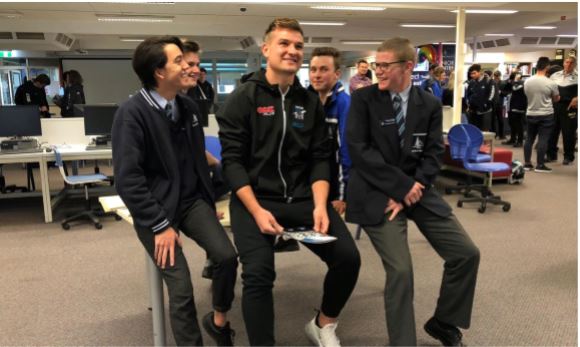
A Port Adelaide Football Club program teaching teen boys how to recognise and stop abuse towards women and girls shows great potential to expand its positive impact.
The Power to End Violence against Women (PTEVAW) currently targets year 10 students in SA metropolitan and regional public schools, and teaches them how to recognise and stand up to disrespect of women in their lives.
A new report into the program, led by Dr Jonathon Louth from the Australian Centre for Community Services Research at Flinders University, highlights ways the program has inspired secondary students across SA to become ‘positive bystanders’.
Examples include challenging low-level behaviours and breaking the silence by calling out sexist banter, and learning how and when to step in when they witness inappropriate behaviour.
Lead author Dr Louth says the report shows how the deployment of high-profile AFL stars can ‘cut through’ unhealthy biases and complicit silence.
“The PTEVAW program is about getting into schools and using sport as a hook and our research shows that the sport element does cut through and gets the attention of the boys in the classroom, so that’s a really important finding,” says Dr Louth, from the College of Business, Government and Law at Flinders.
The research outlined how messages about respectful relationships are sticking with male secondary school students beyond the classroom when delivered by AFL players and program facilitators.
“We ran focus groups with boys who took part in the program over the past two years and tracked changes between the groups,” Dr Louth says.
“We found certain messages did stick with the boys because they took notice when Travis Boak or Ollie Wines talked about treating women respectfully,”
“While we are not in a position to measure the extent to which the retention of key messages transitions into behaviour change over the long-term, the study reveals indicators of positive outcomes.”

The PTEVAW and the Northern Territory-based ‘NO MORE’ awareness campaign both used football to engage men and boys around awareness and behavioural changes.
Asked a year after undertaking the program how it had influenced them personally, students stated key messages were being put it into practice every day.
However, the report also includes recommendations to increase the programs positive reach by:
- Extending the program beyond the year 10 cohort to create a whole-of-school approach
- Involving women and girls in primary prevention strategies
- Committing to longitudinal evaluation to track the impact of the program within each setting, and
- Developing student leaders and allies to assist with delivering the program to their peers.
More than 4600 students have engaged with PTEVAW since it began in 2016. The program is delivered over two weeks and is run in partnership with Power Community Ltd, Centacare Catholic Family Services and the State Government.
“One of the most important findings in the report is the need for commitment over a prolonged period,” says research fellow Dr Louth, who also receives funding from CatholicCare NT and Centacare Catholic Family Services.
“Primary prevention doesn’t happen overnight because you won’t see positive results until you’ve done it for a considerable amount of time,” he says.
Read more in ‘How sport can tackle violence against women and girls‘ in The Conversation.
The report, ‘Developing the power to say no more to violence against women: An investigation into family and domestic violence primary prevention programs in South Australia and the Northern Territory,’ was written by Dr Louth, Tanya MacKay and Associate Professor Ian Goodwin-Smith.

